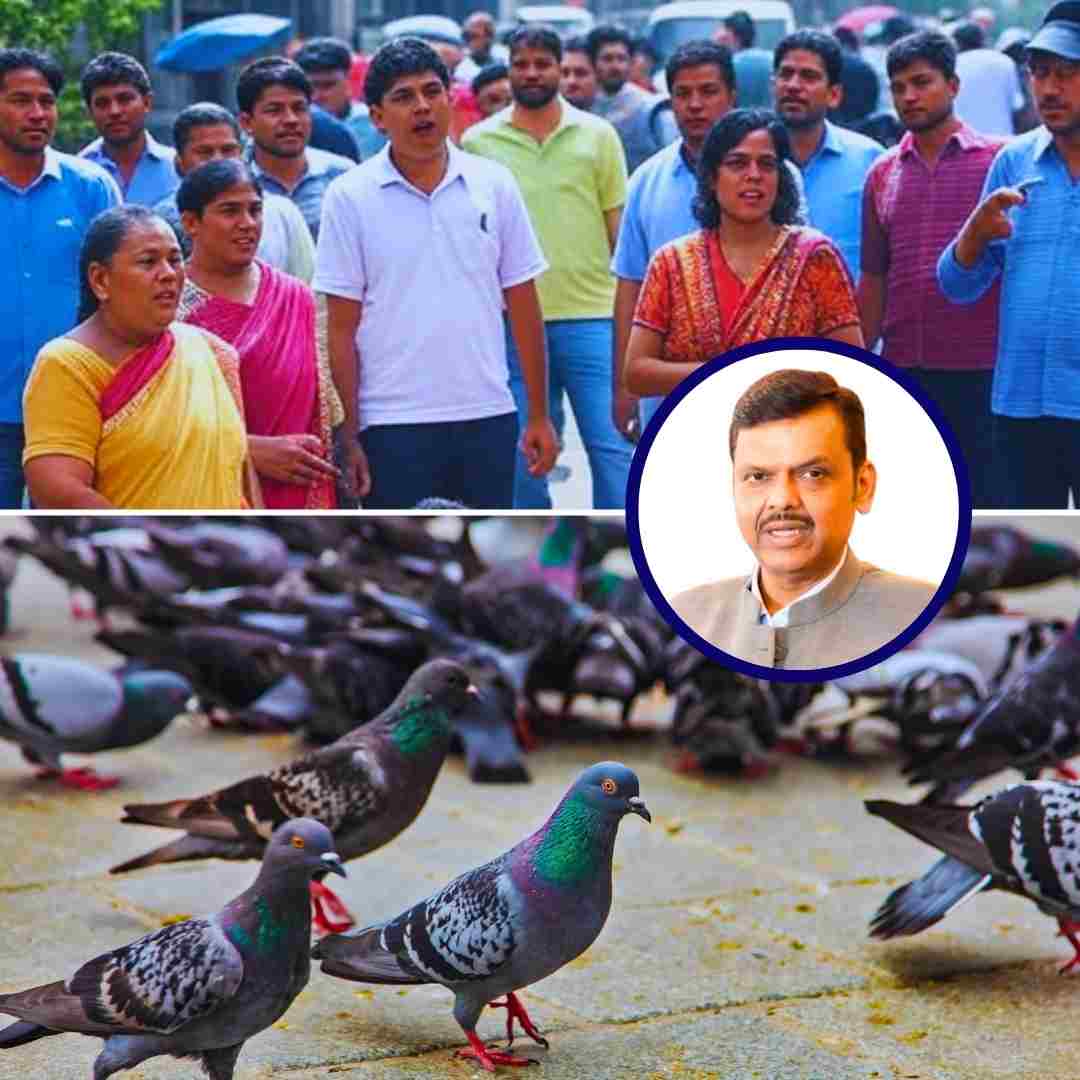Mumbai is witnessing a major controversy after the Brihanmumbai Municipal Corporation (BMC), following a Bombay High Court directive and Maharashtra government orders, imposed a ban on feeding pigeons at traditional feeding spots called kabutarkhanas.
The ban aims to tackle serious public health risks linked to pigeon droppings, such as respiratory diseases and the corrosion of heritage sites. More than 140 individuals have been fined, and FIRs filed against those disobeying the ban, triggering protests by community groups-particularly Mumbai’s Jain, Gujarati and Marwari populations, who see pigeon feeding as a religious and ethical duty.
Maharashtra Chief Minister Devendra Fadnavis has recently ordered a partial rollback, allowing supervised and controlled feeding in designated avian zones while instructing the BMC to build bird houses and conduct detailed health impact studies to reconcile public health concerns with cultural traditions.
Public Health Concerns and Enforcement Actions
The Bombay High Court issued its order on July 31, directing the BMC to enforce a strict ban on pigeon feeding at over 50 kabutarkhanas across Mumbai, including the iconic Dadar site, which was covered with tarpaulin sheets as part of the enforcement.
According to court findings and multiple studies, pigeon droppings carry pathogens linked to respiratory ailments such as hypersensitivity pneumonitis and cryptococcosis, which originate from fungal spores and viruses in dried droppings concentrated in crowded urban spaces.
Furthermore, these acidic droppings damage heritage monuments and public infrastructure, accelerating maintenance costs. The BMC has fined more than 140 individuals Rs 500 each for feeding pigeons and filed FIRs against repeat offenders. Bhushan Gagrani, BMC Commissioner, confirmed deploying officers in shifts and installing CCTV surveillance at kabutarkhanas to ensure compliance with health safety norms and court directives.
Cultural Backlash, Protests, and Political Response
The ban has sparked strong opposition from Mumbai’s multicultural communities, especially the Jain, Gujarati, and Marwari groups, for whom feeding pigeons is regarded as a virtuous spiritual practice. On August 6, hundreds of protesters, including Jain monks and local residents, dismantled tarpaulin coverings at the Dadar Kabutarkhana, defying the ban. This led to police intervention and a few detentions.
Political figures like Maharashtra Minister Mangal Prabhat Lodha have voiced concerns about the ban’s humanitarian impact, highlighting that starved pigeons dying in the streets create additional public health hazards. The issue has escalated into “pigeon politics” with demands for the formation of a court-monitored panel to devise sustainable, compassionate solutions.
Responding to the protests and community concerns, Chief Minister Fadnavis met stakeholders and announced a partial rollback, instructing the BMC to allow controlled feeding at designated locations such as BKC and Mahalaxmi Racecourse, build municipal aviaries, and develop feeding schedules regulated by the civic body. He also mandated a scientific study to measure the health impacts of pigeon populations and feeding practices.
Background and Historical Context of Kabutarkhanas
Kabutarkhanas have been integral to Mumbai’s urban landscape for decades, serving as communal feeding grounds for pigeons that thrive largely on food provided by people rather than natural sources. For many communities, especially within Jainism, feeding pigeons is an act of compassion and religious merit, rooted in centuries-old customs.
However, the rapid proliferation of pigeons over recent years, partly due to easy access to food at kabutarkhanas, has led to increased waste, noise, damages to heritage structures like Chhatrapati Shivaji Maharaj Terminus, and health hazards. Prior to the current ban, public debate and legislative discussions were ongoing, marked by conflicting priorities between heritage preservation, public hygiene, and cultural freedoms. The current crisis is the culmination of these tensions, amplified by judicial intervention and civic enforcement.
The Logical Indian’s Perspective
The ban on pigeon feeding in Mumbai highlights a complex challenge between safeguarding public health and respecting deeply rooted cultural and religious practices. While concerns about disease transmission and preservation of heritage sites warrant decisive action, banning a compassionate tradition outright without viable humane alternatives risks alienating communities and eroding social harmony.
The Logical Indian advocates for empathetic, inclusive dialogue among government authorities, health experts, community leaders, and animal welfare groups to forge innovative coexistence strategies. Initiatives like controlled feeding zones, municipal aviaries, and educational campaigns could protect urban hygiene while honouring cultural values and promoting kindness towards living beings.
R












